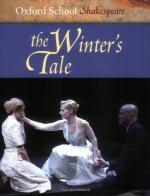Perdita.
[To Polixenes.] Sir, welcome!
It is my father’s will I should take on me
The hostess-ship o’ the day:—
[To Camillo.] You’re welcome,
sir!
Give me those flowers there, Dorcas.—Reverend
sirs,
For you there’s rosemary and rue; these keep
Seeming and savour all the winter long:
Grace and remembrance be to you both!
And welcome to our shearing!
Polixenes.
Shepherdess—
A fair one are you!—well you fit our ages
With flowers of winter.
Perdita.
Sir,
the year growing ancient,—
Not yet on summer’s death nor on the birth
Of trembling winter,—the fairest flowers
o’ the season
Are our carnations and streak’d gillyvors,
Which some call nature’s bastards: of that
kind
Our rustic garden’s barren; and I care not
To get slips of them.
Polixenes.
Wherefore,
gentle maiden,
Do you neglect them?
Perdita.
For
I have heard it said
There is an art which, in their piedness, shares
With great creating nature.
Polixenes.
Say
there be;
Yet nature is made better by no mean
But nature makes that mean; so, o’er that art
Which you say adds to nature, is an art
That nature makes. You see, sweet maid, we marry
A gentler scion to the wildest stock,
And make conceive a bark of baser kind
By bud of nobler race. This is an art
Which does mend nature,—change it rather;
but
The art itself is nature.
Perdita.
So
it is.
Polixenes.
Then make your garden rich in gillyvors,
And do not call them bastards.
Perdita.
I’ll
not put
The dibble in earth to set one slip of them;
No more than were I painted, I would wish
This youth should say, ’twere well, and only
therefore
Desire to breed by me.—Here’s flowers
for you;
Hot lavender, mints, savory, marjoram;
The marigold, that goes to bed with the sun,
And with him rises weeping; these are flowers
Of middle summer, and I think they are given
To men of middle age. You’re very welcome!
Camillo.
I should leave grazing, were I of your flock,
And only live by gazing.
Perdita.
Out,
alas!
You’d be so lean that blasts of January
Would blow you through and through.—Now,
my fairest friend,
I would I had some flowers o’ the spring that
might
Become your time of day;—and yours, and
yours,
That wear upon your virgin branches yet
Your maidenheads growing.—O Proserpina,
From the flowers now, that, frighted, thou lett’st
fall
From Dis’s waggon!—daffodils,




